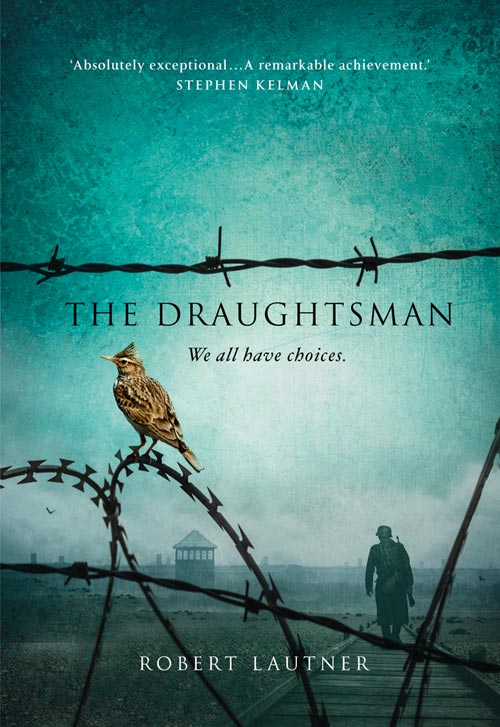Start reading the first chapter of Robert Lautner’s The Draughtsman

The woman at the desk wishes me good morning. She looks like she has been up for hours, fresh and beaming, and I am sure not the same woman I saw last week. My eyes weeping from my walk, worse because they are such a pale blue. Almost an old man’s eyes. An annoyance all my life. Too sensitive to sunlight and wind.
From the clock behind her I am five minutes early. Good, but I realise this is probably where my employers and directors also enter for their work. An anxiety about this. I would rather meet them at my desk in white-coat than in my shiny suit and worn hat.
‘Can I help you, sir?’
She asks so delightfully that I almost do not understand the words. I give her my employment letter.
‘Ernst Beck,’ I said. ‘Hired by Herr Prüfer.’
She asks me to take a seat and presses a telephone.
The chairs are modern. Sweeping chrome and fine leather, more comfortable than my armchair at home. I leaf through technical magazines laid on a low glass and chrome table, one eye to the door to get ready to stand if an expensive suit approaches. But I suppose, with relief, that maybe directors and owners do not get into work so early.
I hear the clack of smart shoes coming from the marble staircase, hurried but rhythmical, like the wearer is dancing down not to meet me but Ginger Rogers.
The gleaming black wing-tips appear, then a suit I do not think I could ever afford. The cloth so black he seems fluid, fl oats to me like a wraith.
He held out his hand as I stood and bowed, lower than I intended.
‘Herr Beck. I am Hans Klein. So pleased to meet you,’ he ushered me to the stairs. ‘I should get you a pass for
your car so it does not get mistaken.’
I do not mention that Klein is also my landlady’s name.
‘No need, Herr Klein. I only live across from the station. I walked.’
‘Oh. Really? Good. I live in Weimar myself. Not in the city. In the country. I apologise. It is my fault to assume that everyone drives to work. I suppose we have many local people here. This way, please.’ He led me up the stairs, talking effortlessly as he went with his dancer’s feet and I struggled to keep up.
‘Come to my office, Herr Beck. I will acquaint you with the nature of things. No need to worry on your first day.
No-one is to expect much of you. Just relax and enjoy. This is why we start you on Thursday. Today and tomorrow you are to familiarise yourself with the department, meet everyone, and we can start you in earnest on Monday.’ We reached the third floor and he smiled as he waited for me to gain. ‘In earnest . . . Ernst.’ He laughed. ‘Earnest Ernst. Quite a quip, no?’
His talk as smooth as his suit.
‘Yes, sir.’ It was then I saw the lift, and he noticed, seemed pleased with my crestfallen look He was not much older but assured in exactly the same way that I am not. If I enter a bar or café I wait patiently until I am attended to. He is one who snaps his fingers and calls.
‘Ah. I forget the lift. I always take the stairs. I drive so much. I take the opportunity to exercise whenever I can.
No need for you, of course, walking everywhere as you do. I am envious of you for that. Come.’
He walked beside me, his arm against my back. I tried to place where I had seen his face before, and then it came. It was in his smile. All teeth. It was Conrad Veidt, an actor, in a film I had seen as a boy. Veidt had left for America with his Jewish wife. He had terrified me as a child in a film. A man who could only grin, ear to ear after a horrible torture to his face. A Victor Hugo book. I thought it would be an adventure, like his other books. It was not. The film ran through my mind in an instant. A silent film. The first card of speech in front of me again:
‘Jester to the king. But all his jests were cruel, and all his smiles were false.’
I was to ask him about his position when we came to his frosted glass door with the gold lettering.
‘Hans Klein. Director of Operations. D IV.’
*
He reached across me to open the door and waved me in before him. ‘Please, Ernst. After you.’ Herr Beck now left downstairs.
He was behind his desk before I reached a chair and I stood beside it while he popped open a metal orb on his desk and dozens of cigarettes fanned out from underneath its top. He took one and an onyx table-lighter and I stood and waited for him to light it and he let me stand while he did so. Three strikes of the lighter and three puff s before he noticed me again. Camels. I could smell they were Camels. Not our cheap German Kamels but actual American. I was not sure if American Camels were black-market. Surely not. Just rare now. Expensive now.
‘Oh. Excuse my manners, Ernst. Please take a seat. I am so often on my own here – excepting meeting with Topf – that I sometimes forget myself with my staff.
’He said, ‘Topf’. Not ‘Herr Topf’.
‘Cigarette?’ He waited until I was seated to offer. I would have to stand to take one.
‘No thank you, sir.’ He closed the orb, the cigarettes drawing in magically.
‘Please. Call me Herr Klein. No formalities on my floor. Do you not smoke? I can smell it on you? Or maybe it is just from walking through the station and the streets?’
‘Yes, but I did not know whether . . . I did not know the rules for the building. I am so used to the ban.’
He took his black leather chair, his suit disappearing within.
‘Fortunately we are not a public building yet. I do not travel publicly so I suppose the smoking ban does not bother. Although we have many contracts with the SS so I would not smoke around them should you see them, or around Prüfer or Topf who are Party members. And you are not permitted to smoke on the draft floors or public areas.’ He leaned back, put his feet up on something I could not see and exhaled hugely. ‘Coffee?’
‘No, thank you. Unless you are having one, Herr Klein?’
‘I never drink coffee.’ He waved his cigarette. ‘I find it disagrees with my Martinis!’
That grin again. I did want coffee. I was lucky if I could afford three cups a week. To be offered it free and to turn it down. Still, my first day. Be a polite fool. These were successful men. Confident men. Not in war. Ernst Beck the young one amongst them. The apprentice. These were not people I knew, not my world.
As a boy I played football – my father’s encouragement – before the first war that was all the entertainment he had. Football a German invention to him. A game that marked towns above each other more than harvest.
I played on the wing, but would always want to be a striker, every boy did. Sometimes we would play against the boys from Weimar, the richer boys. Weimar paid for us to play. Bought our footballs, bought our kit.
‘Let them win,’ my father would say. ‘Ernst. Play the game.’ His finger stern above me, bent to me, breath like stale meat. ‘Do not be the hero. We are not here to always score goals. To win. If we always beat them too much less money they will give. Do you want to play next year or win today? What is for the better?’
The polite fool. Know what you will gain. And what you will lose. The democracy of the football match. Sometimes you cannot afford to be the best team. But you will play next year. I could have scored fi ve times against those Weimar boys. Sometimes a goal is just a goal. Two posts without a net.
‘It is polite,’ my father would say. ‘You win by making it better for next year. By losing today. By abiding.’
I became a good German because of that. Got new kit the next year. Played the game.
‘Do you have your identification card?’ He put out his hand. I fumbled inside my jacket, gave across the rough cardboard we all hated to carry. Not obliged to carry. Preferred. It would go back in a drawer that evening. I had been asked to bring it. Normal to be copied for employment purposes.
‘Thank you, Ernst. I’ll have it back to you today.’ He did not put it away, placed it on his desk, and then it sat between us like a brick. ‘You’ll be given a worker’s pass as an alternative to use.’ He blew his smoke towards me. ‘I have looked over your qualifications. Prüfer and Sander are sure you will be competent. Understand that we have lost a great deal of men to the service over the years. We have to make do with less experienced men, but it is a great opportunity for yourself. I hope you understand?’
‘It is the opportunity I seek and am grateful for, Herr Klein. I will do my best.’ Polite fool.
‘You will have to. These recent months we are often using prisoners from the camps, from Buchenwald, so the plans are ever simpler and of cheaper construction for them to comprehend. Still, the labour is cheap.’ He put out his stub that I would consider not done. ‘I believe that Sander – you will meet him tomorrow – is most looking forward for you to work on his new designs. They are patented but need . . . clarifying. To be presented to the SS. His originals are too complicated for the layman. We need someone to present them efficiently and more simplified. With our shortened workforce all our best draughtsmen are working on the malt works and silos and they have been with the designs for years so that is where our best men need to be. Which is why we have hired yourself, Ernst.’
I straightened in my seat.
‘Am I not to be working for the silo department?’
‘No. Sander is our chief designer for the crematoria. My department. “Special Ovens.” Our smallest department. The smallest part of our business. But we are one of the foremost in the world. And getting ever busier, thanks to the SS. The more camps they build the more ovens they need. And because they want them so cheap they are always wanting repairs. Repeat business. The best business. Prüfer and the engineers are always fixing something at Auschwitz or Buchenwald and beyond. I limit myself to Buchenwald if I can.’ He stood and I followed. ‘Come. I will show you the floor. Not the floor with the skylights I’m afraid. That is for our top draughtsmen. But the second floor is pleasant enough. There is a fine view of the hills. All day you can see the smoke from Buchenwald rising to them. It is a pleasant room.’ His hand on my back again, his other already on the door.

